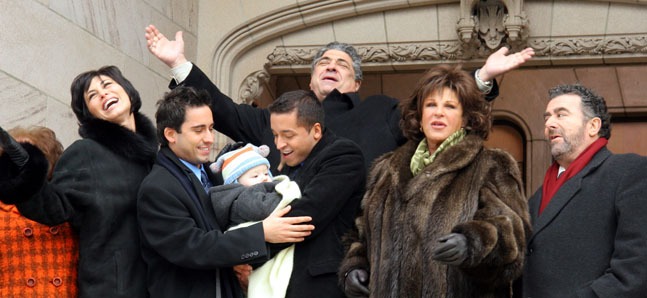The big 20 for gay film
Tokyo International Lesbian & Gay Film Festival hits two decades

‘Oy Vey! My Son Is Gay!’
Posted: Wed Jul 07 2010
The Tokyo International Lesbian & Gay Film Festival, which will celebrate its 20th anniversary next year, would not have made it through 19 years running without the sheer enthusiasm of its volunteers all of whom hold down regular jobs. Film festival representative, Hideki Miyazawa, spoke to Time Out Tokyo about the history of the film festival, issues that relate specifically to holding a LGBT film festival (LGBT standing for Lesbian, Gay, Bisexual and Transgender), and the more recent opening up of society with regards to sexuality.
‘When it first started in 1992, the films were screened in the meeting room of an LGBT activist organization. It began as a liberation movement, and at the time most of the staff and the audience belonged to a sexual minority. Later however, when the film festival opened up to the general public, it became more about the ‘entertainment’ value and the audience became much more diverse,’ says Miyazawa.
Probably the biggest obstacle for a film festival associated with LGBT is that in Japan sexuality is a fairly closed topic. As such there have been some festival goers who until a few years ago put off participating even though they wanted to.
Miyazawa explains, ‘In the past, fewer people had ‘come out’ in comparison to now. Many people came to the festival secretly and they felt like everyone was looking at them. However, recently it feels much more open with people coming with friends or bringing their straight friends. Changes toward attitudes regarding sexuality, is reflected in our audience.’
New venue
The film festival moving to Wald9 Cinema in Shinjuku could be seen as a sign of big progress. This has not only made it easier to gain access to film distribution companies but also the festival organisers have also received feedback from people who felt it difficult to attend in the past, such as: ‘I went for the first time because it is much easier to go to a regular cinema’. However, in Japan there are many businesses that are resistant to the words ‘gay’ and ‘lesbian’. Getting the cooperation of mainstream cinemas and distribution companies, and business sponsorship has been an almost impossible task.
‘Embassies of countries which formally recognise same sex marriages like Sweden and Canada have been great,’ says Miyazawa, ‘but it has been almost impossible to get the support of countries that do not recognise same sex marriages. And while there are some foreign companies in Japan that tend to be ‘gay friendly’, it really does depend on the person you deal with.’
An untapped market
Big name sponsors that are established internationally (for example furniture maker Ikea and clothing brand Uniqlo) are actively supporting a huge LGBT market. On the flipside, there aren’t many domestic companies that are willing to be sponsors.
‘We have always had to pay commuting costs and other expenses from out of our own pockets and while it’s no real compensation, finally from last year, we started getting paid for commuting costs,’ Miyazawa tells us. ‘Every year, when it gets to the closing party and we raise our glasses to a toast, I think about the packed screenings and the smiles on the audience members’ faces and I feel like it was worth all the hard work.’
This colourful event is put together through overcoming these difficulties and through the sheer determination and resourcefulness of those involved. Make the most of this opportunity to see films with a strong message unique to this festival and a program packed with the kind of original works that you would expect from independent film making.
The 19th Tokyo International Lesbian & Gay Film Festival 2010
Date: Fri July 9-Sun July 11
Location: Shinjuku Wald9 Cinema (Full details & map)
Date: Thur July 15-Mon July 19
Location: Spiral (Full details & map)
Website: tokyo-lgff.org/2010/e/ (English)
(more on the Tokyo International Lesbian and Gay Film Festival)
Tweets
- About Us |
- Work for Time Out |
- Send us info |
- Advertising |
- Mobile edition |
- Terms & Conditions |
- Privacy policy |
- Contact Us
Copyright © 2014 Time Out Tokyo














Add your comment